人教版 初中英语知识点介词
- 格式:doc
- 大小:18.00 KB
- 文档页数:5
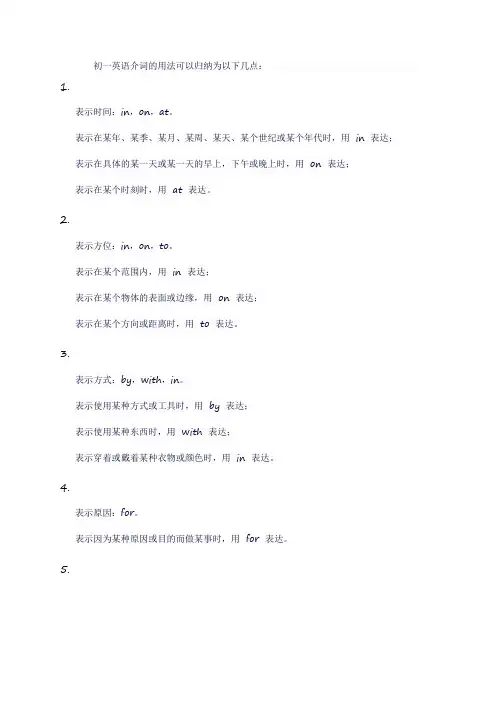
初一英语介词的用法可以归纳为以下几点:
1.
表示时间:in,on,at。
表示在某年、某季、某月、某周、某天、某个世纪或某个年代时,用in 表达;
表示在具体的某一天或某一天的早上,下午或晚上时,用on 表达;
表示在某个时刻时,用at 表达。
2.
表示方位:in,on,to。
表示在某个范围内,用in 表达;
表示在某个物体的表面或边缘,用on 表达;
表示在某个方向或距离时,用to 表达。
3.
表示方式:by,with,in。
表示使用某种方式或工具时,用by 表达;
表示使用某种东西时,用with 表达;
表示穿着或戴着某种衣物或颜色时,用in 表达。
4.
表示原因:for。
表示因为某种原因或目的而做某事时,用for 表达。
5.
表示除了:except,besides。
表示从整体中除去某部分时,用except 表达;
表示除了某人或某物外还有其他的时,用besides 表达。
以上是初一英语介词的用法归纳,需要强调的是,介词的用法是多样的,具体使用需要根据语境和上下文来判断。
因此,在学习介词时需要多加练习和运用。
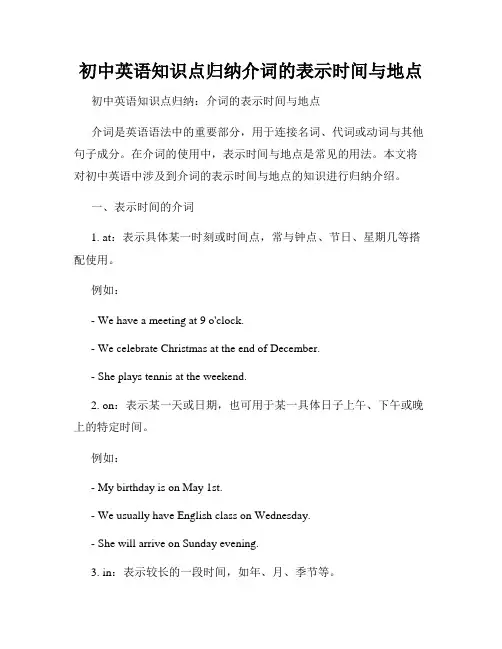
初中英语知识点归纳介词的表示时间与地点初中英语知识点归纳:介词的表示时间与地点介词是英语语法中的重要部分,用于连接名词、代词或动词与其他句子成分。
在介词的使用中,表示时间与地点是常见的用法。
本文将对初中英语中涉及到介词的表示时间与地点的知识进行归纳介绍。
一、表示时间的介词1. at:表示具体某一时刻或时间点,常与钟点、节日、星期几等搭配使用。
例如:- We have a meeting at 9 o'clock.- We celebrate Christmas at the end of December.- She plays tennis at the weekend.2. on:表示某一天或日期,也可用于某一具体日子上午、下午或晚上的特定时间。
例如:- My birthday is on May 1st.- We usually have English class on Wednesday.- She will arrive on Sunday evening.3. in:表示较长的一段时间,如年、月、季节等。
例如:- I was born in 2005.- He will go to Canada in the summer.- They always go skiing in January.4. during:表示在某一段时间内。
例如:- I read a book during the summer vacation.- They have a party during the New Year's holiday.5. for:表示持续的一段时间。
例如:- I have been learning English for five years.- They will stay in the hotel for a week.二、表示地点的介词1. in:表示在一个较大的范围或区域内。

初中英语知识点归纳介词的用法介词是连接词与词之间,短语与短语之间,在句中表示方向、关系、时间、原因等意义的词语。
在英语中,介词的用法非常丰富多样,掌握好介词的用法,对于学习英语有着重要的意义。
下面将对初中英语中常见的介词用法进行归纳介绍。
一、表示方向、位置和距离的介词1. 在(in):在某个地方或物体内部2. 在(on):在某个平面或表面上3. 在(at):在某个地点4. 在(over):位于之上,不接触5. 在(under):位于之下,不接触6. 在(between):在两个事物之间7. 在(behind):在某物之后8. 在(in front of):在某物之前9. 在(near):在附近10. 在(around):在周围二、表示时间的介词1. 在(at):在某个具体时间点2. 在(in):在某个时间段3. 在(on):在某个具体日期三、表示原因的介词1. 因为(of):表示原因、缘故2. 由于(because of):表示原因、由于四、表示目的、用途和方式的介词1. 为了(in order to):表示目的2. 以便(in order that):表示目的3. 用(with):表示使用的手段或工具4. 通过(by):表示方式、方法5. 以(for):表示目的五、表示比较的介词1. 比较起见(than):表示比较的对象2. 和(with):与某人或某物在一起六、其它常见的介词1. 关于(about):表示涉及某一话题2. 靠(by):表示接近某人或某物3. 经过(through):表示通过某地或某事4. 编写(at):表示在某地工作或活动5. 因(as):表示角色、身份6. 例如(for example):表示举例7. 包括(including):表示包含某物以上是初中英语中常见的介词用法的归纳总结。
熟练掌握这些介词的用法,对于构建正确的句子和语法结构非常重要。
希望能对你的学习有所帮助。
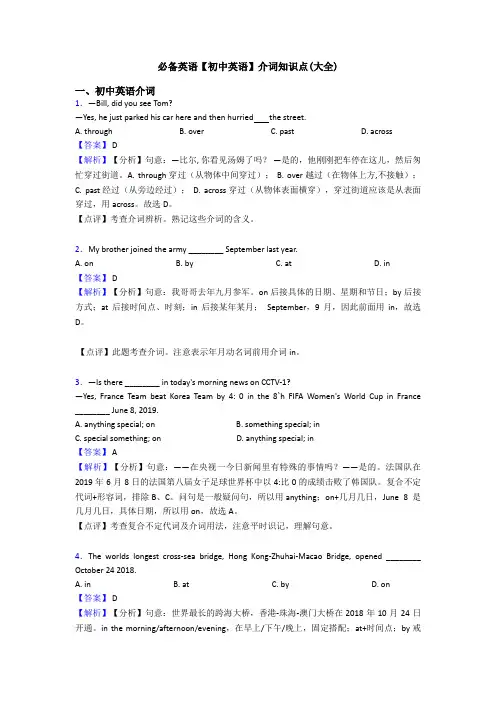
必备英语【初中英语】介词知识点(大全)一、初中英语介词1.—Bill, did you see Tom?—Yes, he just parked his car here and then hurried the street.A. throughB. overC. pastD. across【答案】 D【解析】【分析】句意:—比尔, 你看见汤姆了吗?—是的,他刚刚把车停在这儿,然后匆忙穿过街道。
A. through穿过(从物体中间穿过);B. over越过(在物体上方,不接触);C. past经过(从旁边经过);D. across穿过(从物体表面横穿),穿过街道应该是从表面穿过,用across。
故选D。
【点评】考查介词辨析。
熟记这些介词的含义。
2.My brother joined the army ________ September last year.A. onB. byC. atD. in【答案】 D【解析】【分析】句意:我哥哥去年九月参军。
on后接具体的日期、星期和节日;by后接方式;at后接时间点、时刻;in后接某年某月;September,9月,因此前面用in,故选D。
【点评】此题考查介词。
注意表示年月动名词前用介词in。
3.—Is there ________ in today's morning news on CCTV-1?—Yes, France Team beat Korea Team by 4: 0 in the 8`h FIFA Women's World Cup in France ________ June 8, 2019.A. anything special; onB. something special; inC. special something; onD. anything special; in【答案】 A【解析】【分析】句意:——在央视一今日新闻里有特殊的事情吗?——是的。
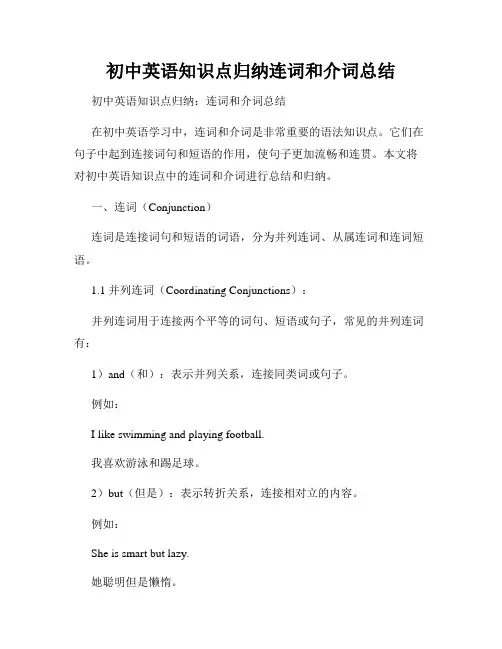
初中英语知识点归纳连词和介词总结初中英语知识点归纳:连词和介词总结在初中英语学习中,连词和介词是非常重要的语法知识点。
它们在句子中起到连接词句和短语的作用,使句子更加流畅和连贯。
本文将对初中英语知识点中的连词和介词进行总结和归纳。
一、连词(Conjunction)连词是连接词句和短语的词语,分为并列连词、从属连词和连词短语。
1.1 并列连词(Coordinating Conjunctions):并列连词用于连接两个平等的词句、短语或句子,常见的并列连词有:1)and(和):表示并列关系,连接同类词或句子。
例如:I like swimming and playing football.我喜欢游泳和踢足球。
2)but(但是):表示转折关系,连接相对立的内容。
例如:She is smart but lazy.她聪明但是懒惰。
3)or(或者):表示选择关系,连接两个或多个选项。
例如:Do you want tea or coffee?你想要茶还是咖啡?1.2 从属连词(Subordinating Conjunctions):从属连词用于连接主从句,引导从句表达因果、时间、条件、目的、方式等关系。
常见的从属连词有:1)because(因为):表示原因或原因结果。
例如:He failed the exam because he didn't study hard.他考试没及格,因为他没好好学习。
2)when(当):表示时间关系,引导时间状语从句。
例如:He called me when he arrived at home.他到家后给我打电话。
3)if(如果):表示条件关系,引导条件状语从句。
例如:If it rains, we will stay at home.如果下雨,我们会呆在家里。
1.3 连词短语(Conjunctive Phrases):连词短语是由两个或多个词组成的短语,起到连接上下文的作用。
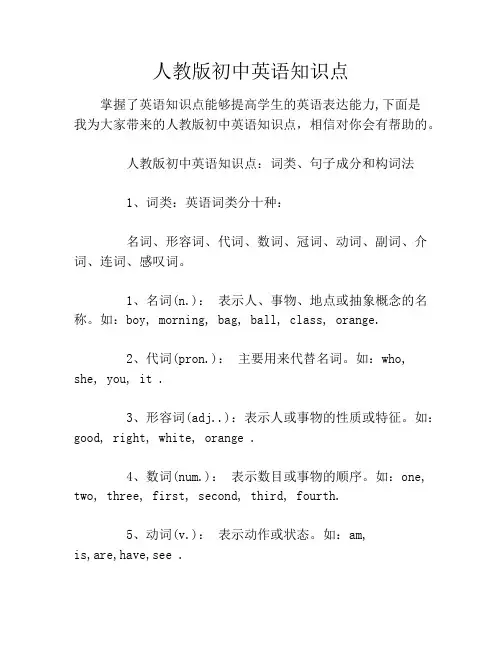
人教版初中英语知识点掌握了英语知识点能够提高学生的英语表达能力,下面是我为大家带来的人教版初中英语知识点,相信对你会有帮助的。
人教版初中英语知识点:词类、句子成分和构词法1、词类:英语词类分十种:名词、形容词、代词、数词、冠词、动词、副词、介词、连词、感叹词。
1、名词(n.):表示人、事物、地点或抽象概念的名称。
如:boy, morning, bag, ball, class, orange.2、代词(pron.):主要用来代替名词。
如:who, she, you, it .3、形容词(adj..):表示人或事物的性质或特征。
如:good, right, white, orange .4、数词(num.):表示数目或事物的顺序。
如:one, two, three, first, second, third, fourth.5、动词(v.):表示动作或状态。
如:am,is,are,have,see .6、副词(adv.):修饰动词、形容词或其他副词,说明时间、地点、程度等。
如:now, very, here, often, quietly, slowly.7、冠词(art..):用在名词前,帮助说明名词。
如:a, an, the.8、介词(prep.):表示它后面的名词或代词与其他句子成分的关系。
如in, on, from, above, behind.9、连词(conj.):用来连接词、短语或句子。
如and, but, before .10、感叹词(interj..)表示喜、怒、哀、乐等感情。
如:oh, well, hi, hello.2、句子成分:英语句子成分分为七种:主语、谓语、宾语、定语、状语、表语、宾语补足语。
1、主语是句子所要说的人或事物,回答是“谁”或者“什么”。
通常用名词或代词担任。
如:I’m MissGreen.(我是格林小姐)2、谓语动词说明主语的动作或状态,回答“做(什么)”。
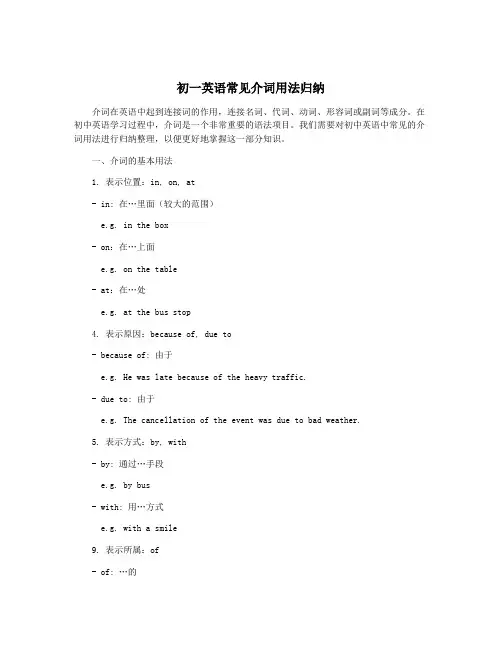
初一英语常见介词用法归纳介词在英语中起到连接词的作用,连接名词、代词、动词、形容词或副词等成分。
在初中英语学习过程中,介词是一个非常重要的语法项目。
我们需要对初中英语中常见的介词用法进行归纳整理,以便更好地掌握这一部分知识。
一、介词的基本用法1. 表示位置:in, on, at- in: 在…里面(较大的范围)e.g. in the box- on:在…上面e.g. on the table- at:在…处e.g. at the bus stop4. 表示原因:because of, due to- because of: 由于e.g. He was late because of the heavy traffic.- due to: 由于e.g. The cancellation of the event was due to bad weather.5. 表示方式:by, with- by: 通过…手段e.g. by bus- with: 用…方式e.g. with a smile9. 表示所属:of- of: …的e.g. the hat of the boy2. look forward to: 期待e.g. I am looking forward to the summer vacation.5. be interested in: 对…感兴趣e.g. Amy is interested in learning Chinese.三、常见介词错误用法及纠正1. 错误用法:depend of正确用法:depend one.g. We depend on each other.通过以上的介词错误用法及纠正,我们可以更清晰地了解该如何正确使用这些介词。
四、综合练习通过上述的综合练习,可以帮助大家更好地掌握介词用法。
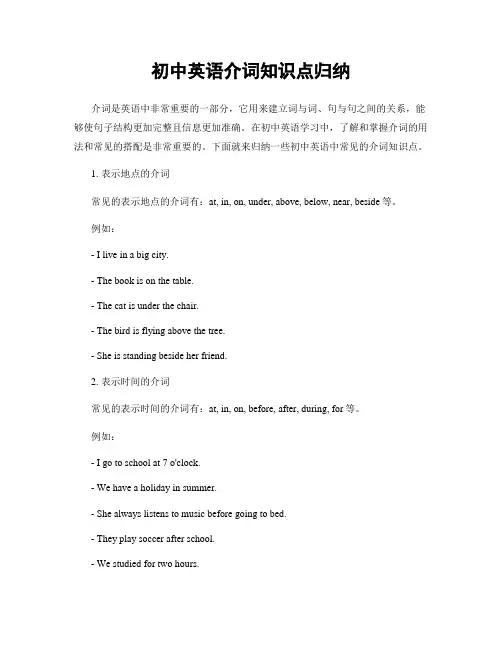
初中英语介词知识点归纳介词是英语中非常重要的一部分,它用来建立词与词、句与句之间的关系,能够使句子结构更加完整且信息更加准确。
在初中英语学习中,了解和掌握介词的用法和常见的搭配是非常重要的。
下面就来归纳一些初中英语中常见的介词知识点。
1. 表示地点的介词常见的表示地点的介词有:at, in, on, under, above, below, near, beside等。
例如:- I live in a big city.- The book is on the table.- The cat is under the chair.- The bird is flying above the tree.- She is standing beside her friend.2. 表示时间的介词常见的表示时间的介词有:at, in, on, before, after, during, for等。
例如:- I go to school at 7 o'clock.- We have a holiday in summer.- She always listens to music before going to bed.- They play soccer after school.- We studied for two hours.3. 表示原因的介词常见的表示原因的介词有:because of, due to, thanks to等。
例如:- He couldn't come because of the bad weather.- The match was canceled due to the heavy rain.- Thanks to your help, I finished my homework.4. 表示目的的介词常见的表示目的的介词有:for, to等。
例如:- He bought a gift for his mother.- She went to the supermarket to buy some food.5. 表示方式的介词常见的表示方式的介词有:by, with等。
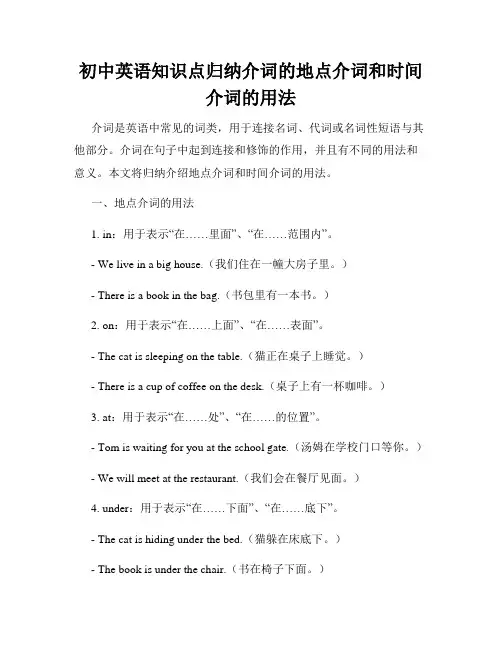
初中英语知识点归纳介词的地点介词和时间介词的用法介词是英语中常见的词类,用于连接名词、代词或名词性短语与其他部分。
介词在句子中起到连接和修饰的作用,并且有不同的用法和意义。
本文将归纳介绍地点介词和时间介词的用法。
一、地点介词的用法1. in:用于表示“在……里面”、“在……范围内”。
- We live in a big house.(我们住在一幢大房子里。
)- There is a book in the bag.(书包里有一本书。
)2. on:用于表示“在……上面”、“在……表面”。
- The cat is sleeping on the table.(猫正在桌子上睡觉。
)- There is a cup of coffee on the desk.(桌子上有一杯咖啡。
)3. at:用于表示“在……处”、“在……的位置”。
- Tom is waiting for you at the school gate.(汤姆在学校门口等你。
)- We will meet at the restaurant.(我们会在餐厅见面。
)4. under:用于表示“在……下面”、“在……底下”。
- The cat is hiding under the bed.(猫躲在床底下。
)- The book is under the chair.(书在椅子下面。
)5. next to:用于表示“紧靠着……旁边”。
- My house is next to a park.(我的房子紧靠着一个公园。
)- The supermarket is next to the bank.(超市在银行旁边。
)6. between:用于表示“在……之间”、“位于两者之间”。
- The library is between the school and the hospital.(图书馆位于学校和医院之间。
)- The restaurant is between the bookstore and the cinema.(餐厅在书店和电影院之间。
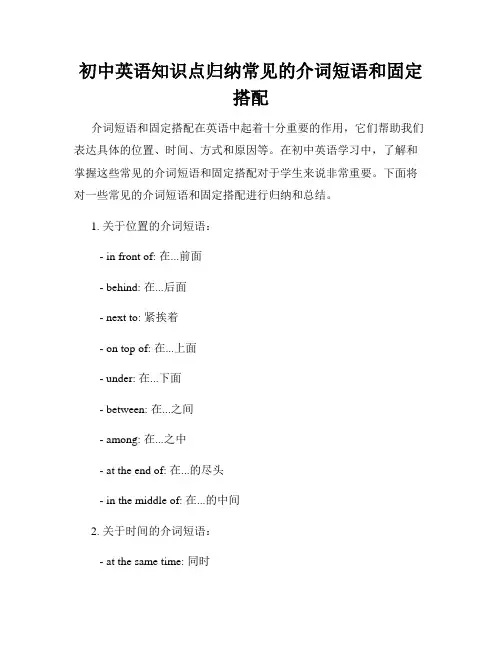
初中英语知识点归纳常见的介词短语和固定搭配介词短语和固定搭配在英语中起着十分重要的作用,它们帮助我们表达具体的位置、时间、方式和原因等。
在初中英语学习中,了解和掌握这些常见的介词短语和固定搭配对于学生来说非常重要。
下面将对一些常见的介词短语和固定搭配进行归纳和总结。
1. 关于位置的介词短语:- in front of: 在...前面- behind: 在...后面- next to: 紧挨着- on top of: 在...上面- under: 在...下面- between: 在...之间- among: 在...之中- at the end of: 在...的尽头- in the middle of: 在...的中间2. 关于时间的介词短语:- at the same time: 同时- on time: 准时- in the morning/afternoon/evening: 在早晨/下午/晚上 - at night: 在晚上- on Monday/Tuesday, etc.: 在星期一/星期二...- in January/February, etc.: 在一月/二月...- during the summer/winter: 在夏天/冬天期间3. 表示方式的介词短语:- by air/train/bus: 乘飞机/火车/公共汽车- on foot: 步行- in a hurry: 匆忙地- with the help of: 在...的帮助下- in a loud/soft voice: 以大声/轻声地4. 常见的介词固定搭配:- interested in: 对...感兴趣- good at: 擅长于- excited about: 对...感到兴奋- proud of: 为...感到自豪- worried about: 担心...- depend on: 依赖...- get along with: 与...相处- look forward to: 期待...- think of: 想到...以上仅是部分常见的介词短语和固定搭配,掌握这些基本用法有助于学生更好地理解和运用英语。
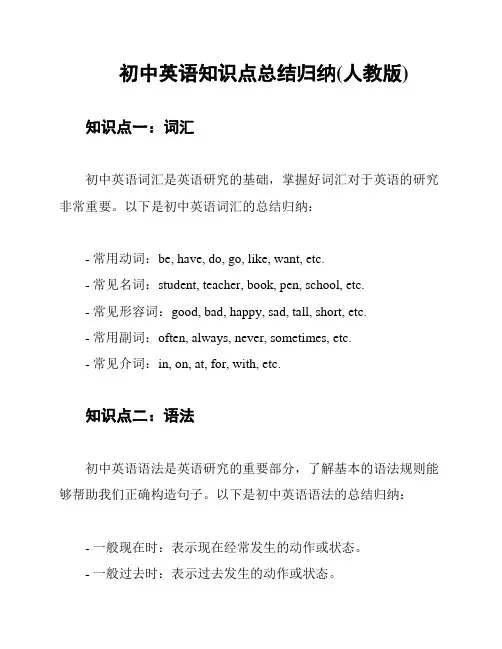
初中英语知识点总结归纳(人教版)知识点一:词汇初中英语词汇是英语研究的基础,掌握好词汇对于英语的研究非常重要。
以下是初中英语词汇的总结归纳:- 常用动词:be, have, do, go, like, want, etc.- 常见名词:student, teacher, book, pen, school, etc.- 常见形容词:good, bad, happy, sad, tall, short, etc.- 常用副词:often, always, never, sometimes, etc.- 常见介词:in, on, at, for, with, etc.知识点二:语法初中英语语法是英语研究的重要部分,了解基本的语法规则能够帮助我们正确构造句子。
以下是初中英语语法的总结归纳:- 一般现在时:表示现在经常发生的动作或状态。
- 一般过去时:表示过去发生的动作或状态。
- 一般将来时:表示将来将要发生的动作或状态。
- 现在进行时:表示现在正在进行的动作。
- 过去进行时:表示过去某个时间段正在进行的动作。
知识点三:阅读理解初中英语阅读理解是培养阅读能力和理解能力的重要方式。
以下是初中英语阅读理解的总结归纳:- 阅读短文时,要注意关键词和上下文的逻辑关系。
- 同义词与反义词的理解。
- 根据文章的语境推断词语的含义。
- 根据问题,寻找文章中的相关信息。
知识点四:写作技巧初中英语写作技巧对于提高英语表达能力非常重要。
以下是初中英语写作技巧的总结归纳:- 写作时要注意语法和拼写的准确性。
- 选择恰当的词汇和句子结构。
- 使用连词和过渡词使文段衔接自然。
- 多读英语文章,研究优秀的写作范例。
以上是初中英语知识点的总结归纳,希望对你的学习有所帮助!。
初中英语知识点归纳介词短语的常见搭配与用法初中英语知识点归纳:介词短语的常见搭配与用法介词短语在英语中是非常常见且重要的语法结构之一。
掌握了介词短语的常见搭配与用法,对于学习和运用英语语言来说至关重要。
本文将归纳介绍初中英语中常见的介词短语搭配及其用法。
一、关于地点的介词短语1. in front of - 在...前面例句:The school is located in front of the park.2. at the top/bottom of - 在...的顶部/底部例句:The book you are looking for is at the top of the shelf.3. on the left/right - 在...的左边/右边例句:She lives in the house on the left.4. next to - 紧挨着,旁边例句:There is a café next to the library.5. in the middle of - 在...的中间例句:The monument stands in the middle of the park.二、关于时间的介词短语1. at (a specific time) - 在(特定时间)例句:I will meet you at 3 o'clock.2. in (a month/year/season) - 在(某个月份/年份/季节)例句:My birthday is in December.3. on (a specific day/date) - 在(特定日子/日期)例句:We usually have a family gathering on Christmas Day.4. during (a period of time) - 在(某段时间)例句:I traveled to Europe during the summer vacation.5. from...to - 从...到...例句:The museum is open from 9 a.m. to 5 p.m.三、关于方式的介词短语1. by car/bus/bike - 通过汽车/公交车/自行车例句:I usually go to work by bike.2. on foot - 步行例句:He goes to school on foot every day.3. with the help of - 在...的帮助下例句:He completed the project with the help of his teammates.4. in a hurry - 匆忙地例句:I left the house in a hurry and forgot to bring my phone.5. by myself/ourselves - 自己例句:I finished the homework by myself.四、关于目的的介词短语1. for (a purpose) - 为了(某个目的)例句:She is studying hard for the exam.2. to (a place) - 去(某个地方)例句:I am going to the supermarket to buy some groceries.3. in order to - 为了例句:He saved money in order to buy a new car.4. with the aim of - 以...为目标例句:They started the project with the aim of promoting environmental awareness.五、关于原因的介词短语1. because of - 因为例句:The match was canceled because of the heavy rain.2. due to - 因为例句:The flight was delayed due to bad weather conditions. 3. as a result of - 由于例句:As a result of his hard work, he obtained excellent results.4. thanks to - 多亏了例句:Thanks to your help, I finished the task on time.六、关于状态的介词短语1. in good/bad condition - 状况良好/不好例句:The car is in good condition after the repair.2. with the help of - 在...的帮助下例句:He fixed the broken computer with the help of his friend.3. under pressure - 在压力下例句:She always performs well under pressure.4. by accident - 偶然地例句:I found this book by accident while cleaning the attic.七、关于数量的介词短语1. a couple of - 两个,几个例句:I bought a couple of books from the bookstore.2. a few - 几个,少量例句:I have a few friends who live in this city.3. a lot of - 许多例句:There are a lot of people in the park today.4. plenty of - 充足的例句:There is plenty of food at the party, so don't worry.以上是初中英语中常见的介词短语搭配及其用法的归纳。
初中英语知识点归纳介词的分类和用法初中英语知识点归纳——介词的分类和用法介词作为英语语法中的重要组成部分,用于连接名词、代词、动词或其他句子成分。
它们在句子中起到指示位置、时间、关系等作用。
下面将对初中英语中介词的分类和用法进行归纳介绍。
一、介词的分类介词一般可以分为以下几类:1. 地点介词:用来表示位置、方向或地点关系,如in(在……之内)、on(在……之上)、at(在……处)等。
例如:- The book is on the table.(这本书在桌子上。
)2. 时间介词:用来表示时间关系,如in(在……内)、on(在……上)、at(在……时刻)、during(在……期间)等。
例如:- I usually have breakfast at 7 o'clock in the morning.(我通常在早上七点吃早餐。
)3. 方式介词:用来表示方式、方法或手段,如by(通过、用)、with(用、携带)等。
例如:- I went to school by bus.(我乘公交车去上学。
)4. 原因介词:用来表示原因、目的或理由,如for(因为、为了)、because of(因为)等。
例如:- He was absent from school because of illness.(他因为生病缺课了。
)5. 目的介词:用来表示目的、结果或效果,如for(为了)、to(为了、到……去)等。
例如:- We study hard for good grades.(我们努力学习是为了取得好成绩。
)6. 关系介词:用来表示关系、连接或起始点,如of(……的)、from(从……来)等。
例如:- The capital of China is Beijing.(中国的首都是北京。
)7. 引导介词:用来引导特定的短语或句子结构,如with(与……一起)、without(没有)等。
例如:- I can't live without my phone.(没有手机,我无法生活。
(完整版)人教版初中英语各单元语法知识点汇总表,推荐文档初中语法知识点Unit 1 My name’s Gina●一般现在时to be●what question 特殊疑问句●yes/no 一般疑问句与回答●物主形容词possessive adj. my, your, his, herUnit 2 This is my sister ●指示代词 demonstrative pronouns –this, these, that, those ●who question●人称代词 subject pronouns –I, he, she, they ●名词复数 plural nounsUnit 3 Is this your pencil?●Possessive pronouns 物主代词mine, yours, his, hers ●yes/no 一般疑问句与回答Unit 4 Where’s my schoolbag?●Where q uestion●Prepositions 介词on, in, under ●Conjunction 连词 andUnit 5 Do you have a soccer ball?●Present tense 一般现在时to have ●Adj. of quality 质量的形容词●Conj. 连词but●Affirmative & negative statements 肯定&否定句Unit 6 Do you like bananas?●Present tense 一般现在时 to have●Countable/uncountable nouns 可数&不可数名词●Affirmative & negative statements 肯定&否定句Unit 7 How much are these socks?●How much 疑问句Unit 8 When is your birthday?●When 疑问句●Possessive 所有格‘sGrade 7上Unit 9 My favorite subject is science ●What, why, when, who 疑问句Unit 1 Can you play the guitar?●Modal verb 情态动词can ●what 疑问句Unit 2 What time do you go to school?●What time 疑问句●When 疑问句●Adverbs of frequency 频率副词 always, often, usually,never 等Grade 7下Unit 3 How do you get to school?●How, how long, how far 疑问句建议收藏下载本文,以便随时学习!我去人也就有人!为UR扼腕入站内信不存在向你偶同意调剖沙龙课反倒是龙卷风前一天Unit 4 Don’t eat in class ●Imperatives 祈使句Don’t●Can for permission 允许●modal verb 情态动词have to, mustUnit 5 Why do you like pandas?●Why, what, where疑问句where are koalas from?●Because…●Adj. of quality 质量的形容词Unit 6 I’m watching TV ●Present progressive tense 现在进行时●What 疑问句what are you doing?Unit 7 It’s raining!●Present progressive tense 现在进行时●How提问how is it going? How is the weather?●What 提问what are they doing?Unit 8 is there a post office over here?●There be结构●Where疑问句●方位介词prepositions of place:in front of, on your left…Unit 9 What does he look like?●What疑问句what does he look like?●Adjectives of description 描述外表形容词straight, tall,thin, heavy, round, handsome等●Alternative questions 选择疑问句is he tall or short?Unit 10 I’d like some noodles ●Would like●What 疑问句what size would you like?●Some/anyUnit 11 How was your school trip?●Simple past tense 一般过去时●How疑问句How was your school trip?●Adj. of description 描述性形容词excellent, interesting,terrible等Unit 12 What did you do last weekend?●Simple past tense 一般过去时●What疑问句What did you play with?●How疑问句how was your weekend?Unit 1 Where did you go on vacation?●Indefinite pronouns 不定代词●Simple past tense of regular & irregular verbs 及物&不及物动词一般过去时Grade 8上Unit 2 How often do you exercise?●How often…?疑问句●Adv. of frequency 频率副词sometimes, usually, often,建议收藏下载本文,以便随时学习!我去人也就有人!为UR扼腕入站内信不存在向你偶同意调剖沙龙课反倒是龙卷风前一天never, once a monthUnit 3 I’m more outgoing than my sister.●比较级Comparatives with –(i)er & more ●both & as…as…Unit 4 What’s the best movie theater?●最高级Superlatives with – (i)est & the most●不规则变化:good-better-best; bad-worse-worstUnit 5 Do you want to watch a game show?●Infinitives usedas objects 不定式to doUnit 6 I’m going to study computer science ●一般将来时Future with be going to ●want to beUnit 7 Will people have robots?●一般将来时Future with will ●want to beUnit 8 How do you make a banana milk shake?●Imperatives 祈使句●How much/how many疑问句●Countable/uncountable nouns●Adverbs of sequence: first, nest, then, finallyUnit 9 Can you come to my party?●Can for invitations●情态动词Modal verb mightUnit 10 If you go to the party, you’ll have a great time!●First conditional 第一/真实条件句if + will ●情态动词Modal verb shouldUnit 1 What’s the matter?●Modal verbs should/shouldn’t for suggestions●Reflexive pronouns 反身代词myself, yourself,themselves, yourselvesUnit 2 I’ll help to clean up the city parks ●Infinitives as object, adverbial and object complement 不定式宾语,状语和宾语不足语●Modal verb could for suggestions●Phrasal verbs 动词短语Unit 3 Could you please clean your room?●Could for polite requests ●Could for permissionUnit 4 Why don’t you talk to your parents?●Why don’t you…?●Conjunctions until, so that and althoughGrade 8下Unit 5 What were you doing when the rainstorm came?●Conj unctions when and while●Questions and statements with the past progressive tense过去进行时建议收藏下载本文,以便随时学习!我去人也就有人!为UR扼腕入站内信不存在向你偶同意调剖沙龙课反倒是龙卷风前一天Unit 6 An old man tried to move the mountains●Conjunctions unless, as soon as and so…that Unit 7 What’s the highest mountain in the world?●Large numbers●Comparatives and superlatives with adj. & adv. 比较急,最高级Unit 8 Have you read Treasure Island yet?●Present perfect tense with already & yetUnit 9 Have you ever been to a museum?●Present perfect tense with been, ever & neverUnit 10 I’ve had this bike for 3 years●Present perfect tense with since & forUnit 1 How can we become good learners?●Verb + by with gerund 动词+by doing sth. 动名词,通过…Unit 2 I think that mooncakes are delicious!●Objective clause with that, if and whether宾语从句●Exclamatory statement 感叹句how & whatUnit 3 Could you please tell me where the restroomsare?●Objective clauses with wh- questions wh-引导宾语从句Unit4 I used to be afraid of the dark●Used to 过去常常Unit 5 What are the shirts made of?●Passive voice (presenttense) 被动语态一般现在时Unit 6 When was it invented?●Passive voice (past tense) 被动语态一般过去时Unit 7 Teenagers should be allowed to choose theirown clothes●Should + be allowed to do sth.Unit 8 It must belong to Carla●Must, might, could & can’t making inferences做推断Unit 9 I like music that I can dance to●Relative clauses with that, who and which关系从句Unit 10 You’re supposed to shake hands ●Supposed to + infinitive 不定式●Expected to + infinitive 不定式●It is + adj. + infinitiveUnit 11 Sad movies make me cry ●Make + sb. + infinitive without to ●Make + sb. + adj.Unit 12 Life is full of the unexpected●Past perfect tense 过去完成式Unit 13 We’re trying to save the earth!●ReviewGrade 9Unit 14 I remember meeting all of you in Grade 7●Review建议收藏下载本文,以便随时学习!。
初中英语知识点归纳常用的介词和介词短语介词是一种连接词,位于句子中,可以表达位置、方向、时间、原因、目的等含义。
在英语学习中,熟练掌握常用的介词和介词短语是非常重要的。
本文将对初中英语中常用的介词和介词短语进行归纳总结,帮助读者更好地理解和运用。
一、位置和方向类介词1. in :表示在某个具体空间或范围内e.g. in the room(在房间里)2. on :表示在某个平面或垂直面上e.g. on the table(在桌子上)3. at :表示在某个位置或地点e.g. at the park(在公园)4. under :表示在某物体的下方e.g. under the chair(在椅子下面)5. above :表示在某物体的上方e.g. above the clouds(在云层上)6. behind :表示在某物体的后方e.g. behind the door(在门后面)7. in front of :表示在某物体的前方e.g. in front of the building(在建筑物前面)二、时间类介词1. at :表示具体的时间点e.g. at 8 o'clock(在8点钟)2. on :表示在某一天或日期e.g. on Monday(在星期一)3. in :表示在某一段时间或月份e.g. in the morning(在早上)4. after :表示在某个时间之后e.g. after school(放学后)5. before :表示在某个时间之前e.g. before dinner(晚饭前)三、原因和目的类介词1. because of :表示由于某个原因e.g. He couldn't come because of the bad weather.(因为天气不好,他不能来。
)2. thanks to :表示由于某个好事发生e.g. Thanks to his help, I passed the exam.(多亏了他的帮助,我通过了考试。
初中英语知识点:介词知识点总结介词是一种用来表示词词, 词与句之间的关系的词。
在句中不能单独作句字成分。
介词后面一般有名词代词或相当于名词的其他词类,短语或从句作它的宾语。
介词和它的宾语构成介词词组,在句中作状语,表语,补语或介词宾语。
一、表示时间的介词时间介词有in , on,at ,after ,since ,during,by,before,after,until 等,前三个介词用法有个口诀:at 午夜、点与分,上午、下午、晚用in 。
年、月、年月、季节、周,之前加上介词in 。
将来时态多久后,这些情形亦用in 。
日子、日期、年月日,星期之前要用on。
其余几组常见的时间介词辨析如下辨析如下:1、时间介词in 与after 的用法辨析介词in + 一段时间用于一般将来时。
如:We’ll go to school in two weeks.介词after + 一段时间用于一般过去时。
如:My mother came homeafter half an hour.介词after + 时间点常用于一般将来时。
如:We’ll go out for a walk after supper.2、时间介词for 与since 的用法辨析介词for 表示一段时间如:I have been living here for 10 years.介词since 表示从过去某一时间以来如:I have been living here since 2000.3、时间介词before 与by 的用法辨析介词before 表示“在, 之前”如:He won’t come back before five .介词by 表示“到, 时为止,不迟于, ”如:The work must be finished by Friday.4、时间介词during 与for 的用法辨析当所指的时间起止分明时用介词during 如:He swims every day during the summer.如果一段时间不明确则用介词for 如:I haven ’t seen her for years.5、时间介词till 与until 用法的异同till 和until 用在肯定句中,均可表示“直到, 为止”,如:I will waittill(until)seven o'clock.till 和until 用在否定句中,均可表示“在, 以前”或“直到, 才”。
Unit 3 My school!学习目标单元主题人与自我→生活与学习→多彩、安全、有意义的学校生活必备单词Section A1.hall/hɔ:l/n.礼堂;大厅2.building/'bɪldɪŋ/n.建筑物;房子3. across/ə'krɒs/prep&adv.过;穿过4.gym/dʒm/n.(=gymnasium) 体育馆,健身房;(尤指学校的)体育活动5.field/fi:ld/n.场地;田地6.office/'ɒfɪs/n.办公室7.large/la:dʒ/adj.大的;大号的8.special/'speʃl/adj.特别的;特殊的9.smart/sma:t/adj.智能的;聪明的10.whiteboard/'waɪtbɔ:d/n.白板;白色书写板11.important/ɪm'pɔ:tnt/j.重要的12.notice/'nəutɪs/n.通知;注意v.注意到;意识到13.locker/'lɒkə(r)/n.有锁存物柜;寄物柜14.drawer/drɔ:(r)/n.抽屉15.corner/'kɔ:nə(r)/n.角;墙角;街角16.bookcase /'bʊkkeɪs/n.书架;书柜17.screen/skri:n/n.屏幕;银幕1.modern/'mɒdn/adj.现代的;当代的2.amazing /ə'meɪzɪŋ/adj.令人惊奇(惊喜或惊叹)的3.raise/reɪz/v.使升高;提高4.flag/flæg/n.旗;旗帜5.most/məust/adj.&pron.大多数;最多;最大adv.最6.change /tʃeɪndʒ/v.&n.改变;变化Section B 7.seat/si:t/n.座位8.delicious/dɪ'lɪʃəs/adj.美味的;可口的9.yours/jɔ:z/pron.(通常写作Yours,用于书信结尾的签名前)你的;10.send/send/v.发送;邮寄11.similar/'sımələ(r)/adj.类似的;相像的12.sound/saund/v.听起来;好像n.声音;响声高频短语1.dining hall 餐厅10.at school在学校2.in front of在······前面11.different from与······不一样3.next to 紧邻;在······近旁12.do exercises做体操4.across from在对面13.change seats 换座位5.sports field运动场14.similar to类似的;相像的6.put up张贴;搭建15.sounds fun 听起来有趣7.desk drawer 书桌抽屉16.tell sb about sth 告诉某人关于某事8.at the back(of)在(······)后面17.bye for now再见9.reading corner 阅读角18.most of...···的大多数/大部分常考句型1.表示“问路”与“指路”的句型:-Where's the dining hall?餐厅在哪里?-It's in front of the art building.它在艺术大楼的前面。
初中英语知识点:介词
知识点总结
介词是一种用来表示词词, 词与句之间的关系的词。
在句中不能单独作句字成分。
介词后面一般有名词代词或相当于名词的其他词类,短语或从句作它的宾语。
介词和它的宾语构成介词词组,在句中作状语,表语,补语或介词宾语。
一、表示时间的介词
时间介词有in , on,at, after, since,during,by,before,after,until等,前三个介词用法有个口诀: at午夜、点与分,上午、下午、晚用in。
年、月、年月、季节、周,之前加上介词in。
将来时态多久后,这些情形亦用in。
日子、日期、年月日,星期之前要用on。
其余几组常见的时间介词辨析如下辨析如下:
1、时间介词in与after 的用法辨析
介词 in + 一段时间用于一般将来时。
如:We’ll go to school in two weeks.
介词after + 一段时间用于一般过去时。
如:My mother came home after half an hour.
介词after + 时间点常用于一般将来时。
如:We’ll go out for a w alk after supper.
2、时间介词for与since的用法辨析
介词for 表示一段时间如:I have been living here for 10 years.
介词since 表示从过去某一时间以来如:I have been living here since 2000.
3、时间介词before与by的用法辨析
介词before表示“在…之前”如:He won’t come back before five .
介词by表示“到…时为止,不迟于…”如:The work must be finished by Friday.
4、时间介词during与for的用法辨析
当所指的时间起止分明时用介词during如:He swims every day during the summer.
如果一段时间不明确则用介词for如:I haven’t seen her for years.
5、时间介词till与until用法的异同
till和until用在肯定句中,均可表示“直到…为止”,如:I will wait
till(until)seven o'clock.
till和until用在否定句中,均可表示“在…以前”或“直到…才”。
如:Tom didn't come back till(until)midnight.
till多用于普通文体,而 until则用于多种文体,并且在句子开头时,用until而不用till如:Until he comes back,nothing can be done.
注意:在last, next, this, that, some, every 等词之前一律不用介词。
二、表示方位的介词
常用的表示方位的介词用法及辨析如下:
1、方位介词on, over, above的用法辨析
介词on表示一物放在另一物上面,两者紧贴在一起,如:The book is on the table.
介词over表示一种垂直悬空的上下关系,即“在…上方”,如:Is there any bridge over the river?
介词above表示一般的“高于…”,“在…之上”,如:There was an electric clock above his bed.
2、方位介词under与below的用法辨析
介词under是over的反义词即“在…下方”,如:They were seen under the tree.
介词below是above的反义词即“低于…”,“在…之下”,如:They live below us.
3、方位介词across,、through、over,、past的用法辨析
介词across着重于“从一头或一边到另一头或另一边”,强调从表面穿过。
如:She went across the street to make some purchases.
介词through着重于“穿越”,强调从一定的空间内穿过。
如:The sunlight was coming in through the window.
介词over多表示从“上方越过”,如:He failed to go over the mountain; he had to go round it.
介词past表示从“面前经过”,如:Someone has just gone past the window.
4、地点介词at与in的用法辨析
介词at表示较小的地方,如家、村、乡村等,如:He lives at a small village.
介词in表示较大的地方,如大城市、国家、洲等,如:He lives in Beijing.
5、表示东南西北的时候,地点介词in、on、to的用法辨析
介词in表示“包含”如:Beijing is in the north of China.
介词on表示“紧邻”如:Canada lies on the north of the U.S.
介词to表示“没接触”如:France lies to the south of England.
三、表示方式、手段、或工具的介词by,in,on,with.
1、by,in,on,表示交通方式。
用by 时,交通工具前不用任何词;用 in和on 时,交通工具前用冠词或形容词性物主代词。
例如by car=in a car,by bike=on a bike.
2、表示手段或工具,with后跟具体工具,如I write with a pen;in表示使用某种语言或墨水、颜色等原料,例如:in English.
四、介词的固定搭配
across from在对面 look for 寻找 look after 照顾 get on with 与某人相处
agree with 同意(某人) arrive at(in) 到达 ask for 询问begin…with 从……开始believe in 相信 break off 打断 break out 爆发 bring down 降低 bring in 引进 bring up 教育,培养 build up 建起 burn down 烧光 call back 回电话 call for 要求约请 call on 拜访访问 care for 喜欢 carry on 继续开展 carry out 实行开展 check out 查明结帐 come about 发生,产生 come out 出来 come to 共计达到compare…with 与……比较 compare to 比作 cut off 切断 date from 始于 depend on 依靠 devote to 献于 die out 灭亡 divide up 分配 dream of 梦想 fall off 下降 fall over 跌倒 feed on 以……为食 get down to 专心于 get through 通过
常见考法
对于介词的考察,通常是以单项选择或完形填空形式考查介词用法,尤其是几个易混淆的代词。
另外,介词与动词和形容词构成的固定搭配也是常见的考试内容。
误区提醒
1、掌握介词固定搭配
2、准确把握介词及介词短语的基本意义和用法。
典型例题1:Peter usually gets up early the morning.
A in
B on
C at
D of
解析;这是20XX年北京市的一道中考题,本题考查时间介词的用法。
“在早上”应为in the morning.
答案:A
典型例题2:-How do you usually go to school?
- my bike.
A By
B In
C On
解析; 虽然介词by表示“乘坐”,但是它所接的名词前没有限定词,即by bike.而本题中bike 前有限定词my,这时应用on.
答案:C。